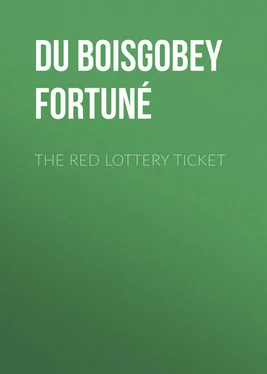Fortuné Du Boisgobey - The Red Lottery Ticket
Здесь есть возможность читать онлайн «Fortuné Du Boisgobey - The Red Lottery Ticket» — ознакомительный отрывок электронной книги совершенно бесплатно, а после прочтения отрывка купить полную версию. В некоторых случаях можно слушать аудио, скачать через торрент в формате fb2 и присутствует краткое содержание. Жанр: foreign_antique, foreign_prose, foreign_sf, на английском языке. Описание произведения, (предисловие) а так же отзывы посетителей доступны на портале библиотеки ЛибКат.
- Название:The Red Lottery Ticket
- Автор:
- Жанр:
- Год:неизвестен
- ISBN:нет данных
- Рейтинг книги:5 / 5. Голосов: 1
-
Избранное:Добавить в избранное
- Отзывы:
-
Ваша оценка:
- 100
- 1
- 2
- 3
- 4
- 5
The Red Lottery Ticket: краткое содержание, описание и аннотация
Предлагаем к чтению аннотацию, описание, краткое содержание или предисловие (зависит от того, что написал сам автор книги «The Red Lottery Ticket»). Если вы не нашли необходимую информацию о книге — напишите в комментариях, мы постараемся отыскать её.
The Red Lottery Ticket — читать онлайн ознакомительный отрывок
Ниже представлен текст книги, разбитый по страницам. Система сохранения места последней прочитанной страницы, позволяет с удобством читать онлайн бесплатно книгу «The Red Lottery Ticket», без необходимости каждый раз заново искать на чём Вы остановились. Поставьте закладку, и сможете в любой момент перейти на страницу, на которой закончили чтение.
Интервал:
Закладка:
Fortuné Du Boisgobey
The Red Lottery Ticket
I
One day early in April, the month when the lilacs flower and when women begin to display light apparel, a cab could be seen crossing the bridge which spans the Seine between the Faubourg St. Germain and the Louvre, and which is known to the Parisians as the Pont des Saints Pères. The vehicle was going at a quiet trot, and it was driven by a jovial jehu, who hummed a song as he cracked his whip and jerked his reins. Both windows were down, and from each of them came a cloud of bluish smoke – the smoke of the cigars of two young fellows who were gaily chatting inside, and who, although they came from the so-called "Latin Quarter" of Paris, were quite unlike the students immortalised by Gavarni's pencil. They were, indeed, dressed with careful taste, and displayed none of the questionable manners which may be acquired in the drinking dens of the Boulevard St. Michel. One of them, a fair-haired young fellow with soft blue eyes, was named George Caumont, and was the son of a Norman cattle breeder, who lived on his land, saving up his cash, and making his only child an allowance of three thousand francs a year, so that he might complete, in Paris, the study of law which he had commenced at Caen. The other, a dark young man with curly moustaches and a bold expression of face, was the son of a petty nobleman of Périgord, who had left him a heavily mortgaged estate with a somewhat high-sounding name. He was called Adhémar de Puymirol, and lived upon a small allowance made him by an aunt who wished him to become a doctor.
He and George Caumont had met shortly after their arrival in Paris, and their acquaintance had speedily become intimacy, for they had the same ambition and much the same tastes. They both regarded their present situation as a probationary one, hoping sooner or later to contract a brilliant marriage; and they governed themselves accordingly, merely attending the courts and the clinical lectures when they had nothing better to do, and just occasionally passing an examination in order not to discourage Papa Caumont and Aunt Bessèges. But everything comes to an end, and with their relatives grumbling and their creditors barking loudly, there were days when the thought of the future filled them with dismay. Still, on this beautiful spring morning, everything seemed tinged with a roseate hue, and they even laughed at the enforced departure for the provinces apparently so near at hand. "Leave Paris!" said Adhémar, gazing at the scene around him. "Never, George; I would rather give lessons in anatomy to freshmen than go and bury myself in Périgord to doctor my aunt's farmers."
"And I," sighed George, "would rather act as a college tutor than devote the rest of my life to cattle breeding. We are at the end of our tether, unfortunately, and if we don't meet two rich girls before the close of the term, we shall be obliged to decamp, for Paris will be too hot for us."
"Ah, well, we will go to one of the watering-places where heiresses are met."
"You are always so confident!"
"That is the only way to succeed. If our friend Pierre Dargental had become discouraged, we shouldn't now be going to celebrate the close of his bachelor life at lunch. Dargental is no better than we are, and yet he has found a widow of title worth more than a million francs."
"And all he brings her on his side will be his debts – some three hundred thousand francs."
"Oh! in this part of the world, a man shrewd enough to obtain credit to that amount can aspire to anything – "
"Except to the hand of an honest woman," replied George. "There are some pretty hard stories about this Countess de Lescombat's behaviour after her first husband's death."
"Well, they say she accepted Dargental's offer of marriage before her period of mourning expired. She consoled herself a little too soon, perhaps, but that is a matter of no consequence, after all."
"All the same, I should much prefer a less wealthy and more innocent girl to a rich lady of rank, with a very doubtful reputation."
"But one can't always have one's choice in such matters. Dargental is about to enter a very wealthy set. He will introduce us to it, and we ought to succeed in finding what we want there. So it does not become us to find fault with him."
"Will any of his old flames be at lunch to-day?" inquired George.
"I believe that Blanche Pornic, the actress, is the only favoured one."
"She is very amusing."
"Yes; and thoroughly good-hearted."
The vehicle had crossed over the Place du Carrousel, and was now behind five or six others, which had formed into a line to pass through the narrow passage conducting into the Rue de Rivoli. "Five minutes to twelve!" exclaimed Puymirol, glancing at his watch. "They will be at table by the time we reach the Lion d'Or. Why doesn't this idiot of a cabman drive faster?"
"It isn't his fault. The block prevents him from doing so. There are at least half a dozen traps ahead of us."
As George spoke, he put his head out of the window, and saw that the passage would not be free for several minutes. Three or four pedestrians, tired of waiting, had turned to retrace their steps; and among them Caumont noticed a man wearing a broad-brimmed hat, pulled down over his eyes, and a full black beard concealing the lower part of his face. At a distance of ten paces behind him came two unprepossessing individuals, who seemed anxious not to lose sight of this bearded individual. Caumont rather lightly concluded that they were detectives watching the fellow, but as he had no personal interest in the matter he again ensconced himself in his corner and said to his friend: "Have a little patience. We shall soon move on." As he spoke, he turned, and failed to see that the bearded man rested his hand for an instant on the door of the vehicle, and then without glancing at the occupants, dropped something that fell upon Puymirol's boot.
"What is that?" cried Adhémar, "what scoundrel ventures to bombard us in this style?"
"I have no idea," replied George, and on hastily turning again, he caught a fresh glimpse of the bearded man, whose back only was now visible, for he had passed them, and was slowing proceeding across the Place du Carrousel. Just then the cab moved on, and in an instant the pedestrians were left far behind. "Whatever the article is it must have been thrown in by a man who just passed us," resumed George; "and he must have done so with extraordinary swiftness and dexterity, for his movement escaped my notice entirely."
Meanwhile Puymirol had picked up from the bottom of the cab a handsome pocket-book, which, with his friend's assent, he now began to open. "The man who threw that in here," said George, "must be a thief, who in his anxiety to escape arrest, and to get rid of the stolen article, dropped it into our cab. When pickpockets find themselves in danger of capture, they very often resort to that device."
"Well," rejoined Puymirol, "at least there isn't the slightest vestige of a bank-note inside, as you can see for yourself. Nor are there any visiting-cards, nothing but papers, and not many of them. In this compartment there are some lottery tickets, just look: The Tunisian Lottery, the Amiens Lottery, and the Lottery of the Decorative Art Society. And here on the other side there are some letters."
"Letters!" repeated George. "So much the better. We shall perhaps find in them some clue that will enable us to discover the person from whom the pocket-book was stolen."
"You don't know whether it was stolen," remarked Adhémar. "Besides, who would think of stealing lottery tickets?"
"True, but it perhaps contained money, which the thief extracted before throwing away; besides, a letter is sometimes of great value to its writer."
Читать дальшеИнтервал:
Закладка:
Похожие книги на «The Red Lottery Ticket»
Представляем Вашему вниманию похожие книги на «The Red Lottery Ticket» списком для выбора. Мы отобрали схожую по названию и смыслу литературу в надежде предоставить читателям больше вариантов отыскать новые, интересные, ещё непрочитанные произведения.
Обсуждение, отзывы о книге «The Red Lottery Ticket» и просто собственные мнения читателей. Оставьте ваши комментарии, напишите, что Вы думаете о произведении, его смысле или главных героях. Укажите что конкретно понравилось, а что нет, и почему Вы так считаете.












